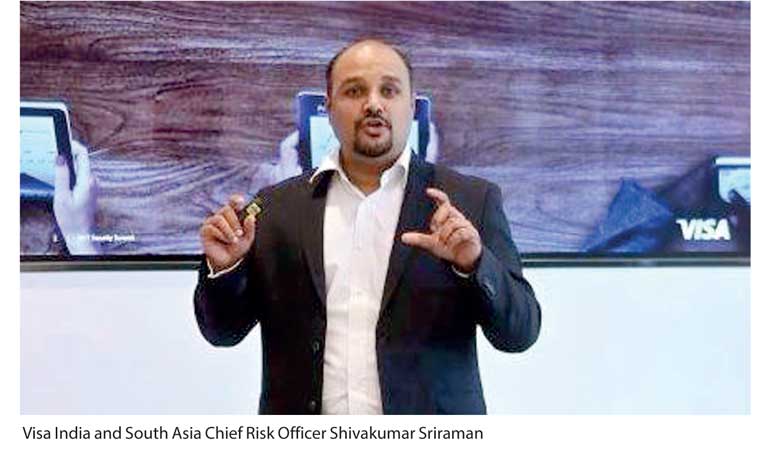Tuesday Mar 03, 2026
Tuesday Mar 03, 2026
Tuesday, 26 September 2017 00:00 - - {{hitsCtrl.values.hits}}
 According to digital payments technology leader Visa data theft remains the driving force behind the shift to remote payments. The key to navigate this is to continually innovate and collaborate in four critical areas to secure a connected world – devalue data, protect data, harness data and empowering customers. These interwoven layers of security keep us much safer than any one of them individually. In this interview with the Daily FT, Visa India and South Asia Chief Risk Officer Shivakumar Sriraman shares key insights as well as how Visa is innovating and leading with measures to make digital payments secure for the benefit of all stakeholders. Here are excerpts.
According to digital payments technology leader Visa data theft remains the driving force behind the shift to remote payments. The key to navigate this is to continually innovate and collaborate in four critical areas to secure a connected world – devalue data, protect data, harness data and empowering customers. These interwoven layers of security keep us much safer than any one of them individually. In this interview with the Daily FT, Visa India and South Asia Chief Risk Officer Shivakumar Sriraman shares key insights as well as how Visa is innovating and leading with measures to make digital payments secure for the benefit of all stakeholders. Here are excerpts.
Q: Why is security important for the payments industry?
A:Trust is integral to a payments system and security is a very critical component of this trust factor. The convergence of finance, technology and commerce are dramatically changing the payments landscape. Payments are becoming more and more seamless and technology is aiding this growth.
Staying ahead of the innovation curve requires us to exceed the customer expectation of convenience and security. We see the payment ecosystem getting more complex with multiple players entering this space. We also see more and more nations adopting digital payments and moving towards less cash economy.
On the other side we are witnessing an increase in data breaches and cyber security incidents. As future is going to be digital and more connected devices will proliferate the payments ecosystem, it is vital for us to secure our connected world.
Q: How conscious are consumers about security?
A:Customer awareness on security varies from country to country. It depends on the ecosystem complexity and the trends seen in that particular market. Having said that, customer awareness and empowerment plays a very critical role in securing the payments ecosystem. It is an ongoing process and every stakeholder in the ecosystem should participate and play a part in increasing this customer awareness.
Q: How has Visa responded to the challenges of security for payment industry and aspirations of consumers in terms of security?
A:Visa believes that security has to keep moving at the speed of innovation. It can be done through responsible innovation and building multiple inter woven layers of security. Collaboration is key to this as the path we’ve laid to secure the payments industry requires a great deal of cooperation. In security, everyone in the ecosystem has a role to play and no one entity can go alone. We closely work with all the stakeholders to ensure security remains at the heart of innovation as we offer a seamless payments experience.
Q: Which of the measures will you single out as Visa’s most significant initiatives in terms of security?
A:Nobody is more focused on payment security than Visa. Key to our success is ensuring customers trust Visa, especially as they increasingly transact in the digital world – making purchases online and through mobile devices. Visa believes in global interoperable standards when it comes to security and closely works with global security bodies like EMVCo, PCI, etc. to build standards which can secure the industry.
Tokenisation will be the next most significant step to take the industry forward as it devalues data and make the data worthless for criminals. The Visa Token Service (VTS), a novel security technology from Visa, replaces sensitive account information, such as the 16-digit primary account number, with a unique digital identifier called a token. The token allows payments to be processed without exposing actual account details that could potentially be compromised. This provides the payment ecosystem with a flexible and scalable way to securely provision and manage digital credentials or tokens across remote e-commerce, m-commerce and mobile contactless form factors.
We will continue to work with merchants to integrate tokens with Visa Checkout, Visa’s wallet service, and tokenise card-on-files to deliver a seamless experience.
Q: What advice would you like to share for payments industry and consumers when it comes to security?
A:Data theft remains the driving force behind the shift to remote payments. The key to navigate this is to continually innovate and collaborate in four critical areas to secure a connected world – devalue data, protect data, harness data and empowering customers. These interwoven layers of security keep us much safer than any one of them individually.